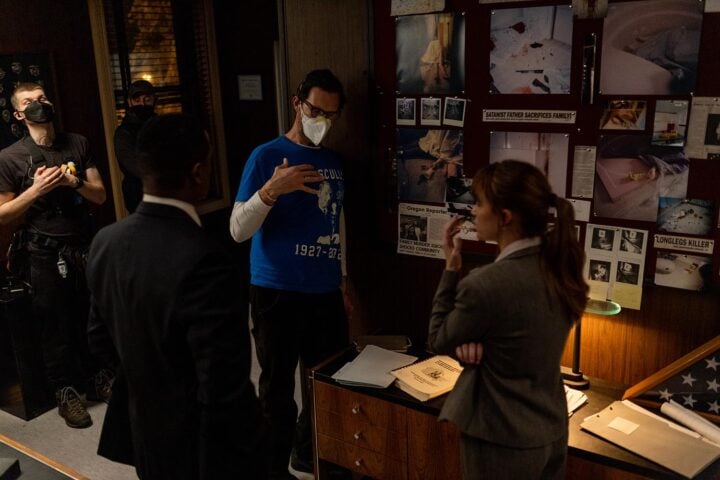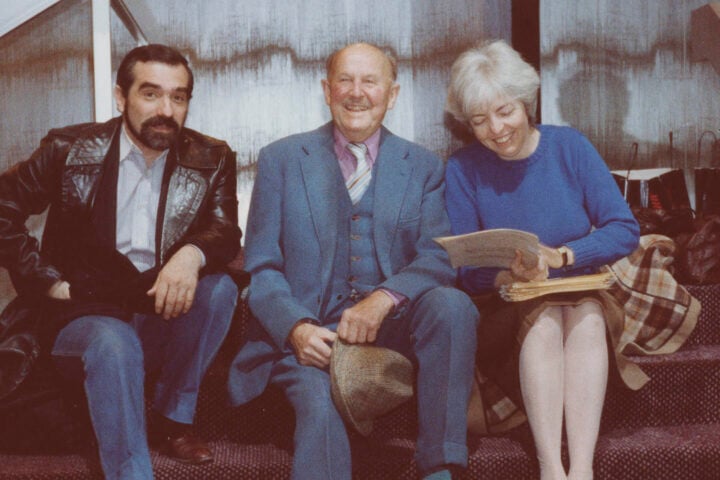Greg Berlanti’s high-concept rom-com Fly Me to the Moon emphasizes the optimism of the Space Race while also regarding the militaristic motives behind early space exploration with a jaundiced, decidedly modern perspective. It opens at the top of 1969, with NASA having less than a year to make good on John F. Kennedy’s 1961 promise to get astronauts to the moon before the end of the decade. With the Apollo program seemingly stalled out and congressional enthusiasm for the space program waning, certain government agencies decide to rejuvenate public interest and secure further federal funding to ensure that the Soviet Union, following a string of spaceflight achievements, doesn’t again embarrass the U.S.
To do so, a mysterious official, Moe (Woody Harrelson), recruits Madison Avenue marketing executive Kelly Jones (Scarlett Johansson) to mount a PR campaign on NASA’s behalf, and to the bafflement of the space agency’s egghead scientists and profound irritation of launch director Cole Davis (Channing Tatum). Amid men dressed in identical white shirts and black ties and slacks, Kelly strolls by in colorful dresses and interrupts the engineers’ work to massage pull-quotes out of them, all the while turning a deaf ear to Cole’s endless protests.
Cole and Kelly immediately clash over her pushy behavior and his stonewalling of NASA’s attempts to boost its profile, yet from the start both display an obvious interest in each other. From a charming meet-cute that precedes their official introduction to the grudging admiration that Cole displays toward Kelly’s runaway success at getting NASA back in the headlines in a big way, they bring both frisson and moments of rapprochement to their interactions, and in ways that make how they enter each other’s romantic orbit feel entirely believable.
Tatum and Johansson play well off each other, with the former heightening Cole’s phases of moral opprobrium and undisguised interest in Kelly and the latter inversely stressing how much Cole’s earnestness throws a natural-born con artist like Kelly, making him at times just as unsettling to her as she is to him. And the actors truly feel at home in the film’s setting. Tatum looks every bit the model of fitness for the time, more stocky than shredded. Johansson, meanwhile, has always wielded her retro-bombshell looks with a certain postmodern awareness that she mostly drops here in favor of playing up her beauty as Kelly’s primary weapon. Kelly knows the effect she has on men and savors it as she freely manipulates them.
Despite their personality differences, Cole and Kelly become increasingly close as their mutual respect grows. But just as the pair seemed destined to smoothly fall into each other’s arms for good, Moe reappears on the scene and informs Kelly that the Nixon White House wishes her to stage a mock video of the moon landing as a contingency plan should Apollo 11 fail.
This narrative turn has been the centerpiece of the film’s marketing, which sells Kelly’s secondary job as pure farce, something undeniably helped by Jim Rash’s broad performance as the hack director she hires for the shoot. In context, though, Fly Me to the Moon plays Kelly’s coerced subterfuge for a shift into maudlin severity that re-emphasizes how badly Cole would be crushed to learn about this given how passionately he pursues the moon mission and, more somberly, how guilt-wracked he still is over the negligence that led to the Apollo 1 disaster.
Fly Me to the Moon’s sudden shift toward the weighty throws off the pace of what had been a formulaic but charming rom-com, as the heavy-handed look at both Cole’s and Kelly’s past demons fails to mesh cohesively with the antic silliness that preceded it. And when the film leans again into airy comedy in the closing stretch, it only exacerbates the jarring tonal dissonance that poured water all over the material’s initial spark.
The film, then ends up embodying the conflicting perspectives of its leads, as it’s ultimately torn between Kelly’s flippancy and Cole’s solemn reverence for its subject matter. As a result, it leaves its capable stars floundering when they should be paying off on their chemistry.
Since 2001, we've brought you uncompromising, candid takes on the world of film, music, television, video games, theater, and more. Independently owned and operated publications like Slant have been hit hard in recent years, but we’re committed to keeping our content free and accessible—meaning no paywalls or fees.
If you like what we do, please consider subscribing to our Patreon or making a donation.






